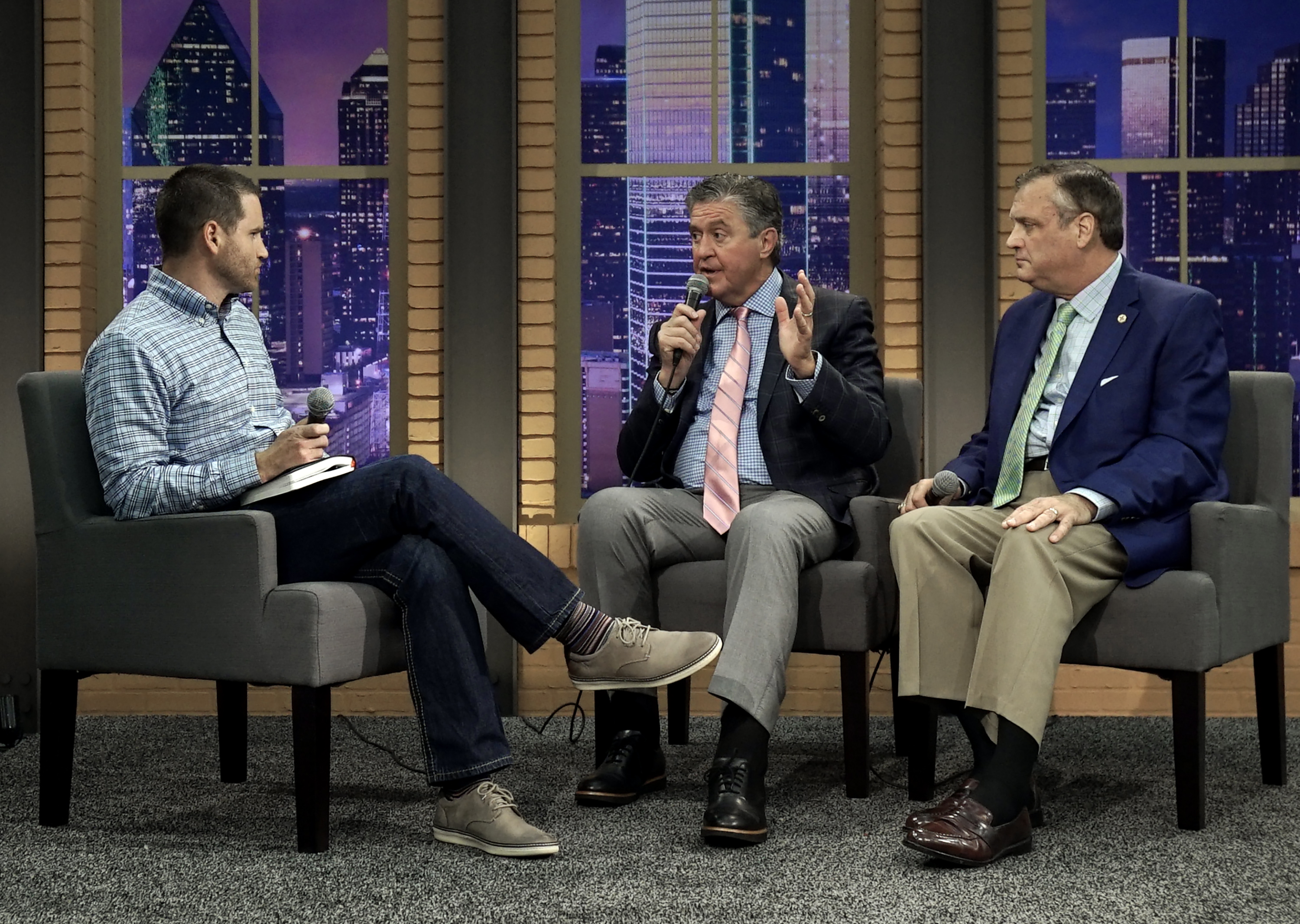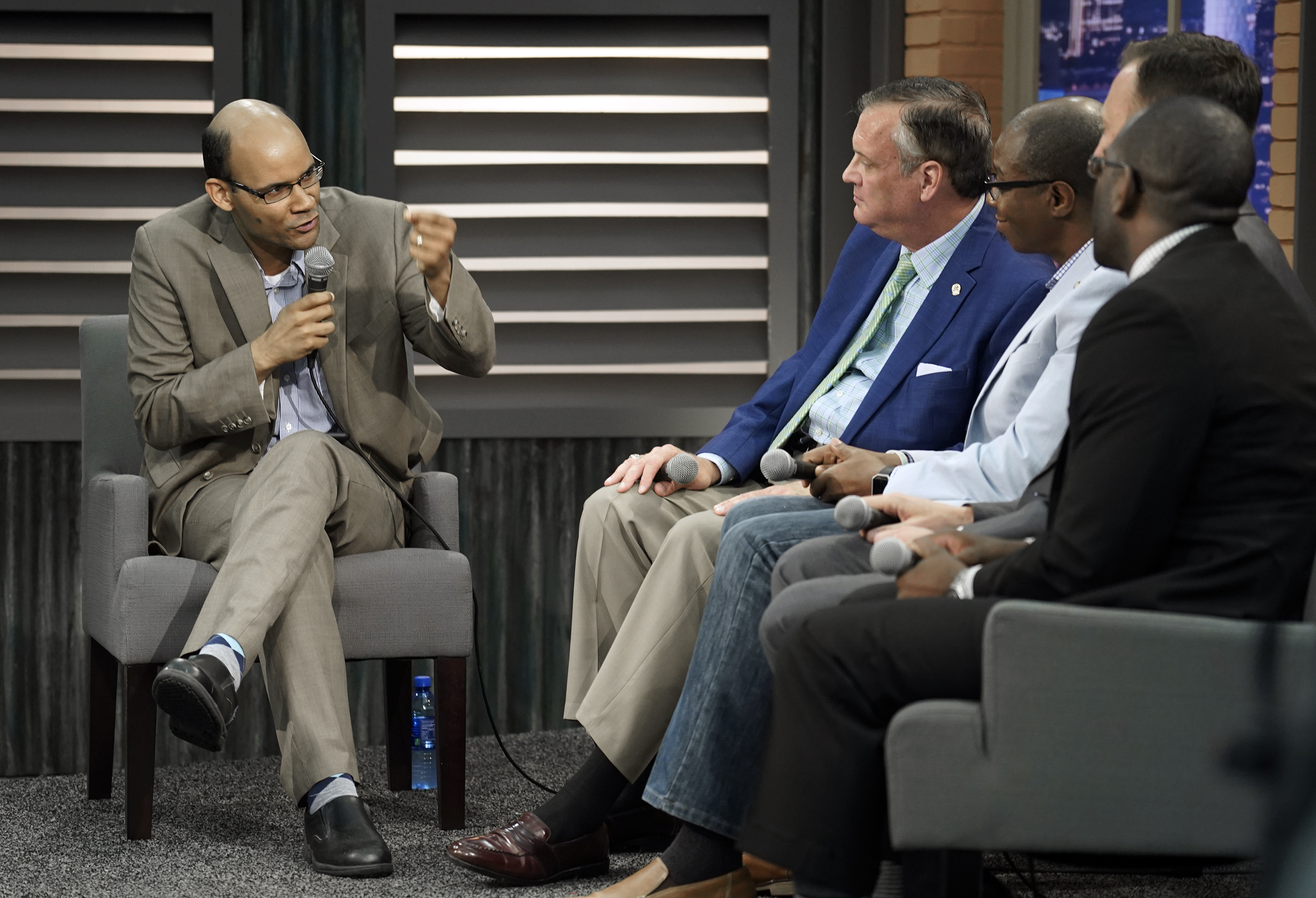 [1]
[1]DALLAS (BP) — Panelists on the Cooperative Program stage in the exhibit hall prior to the Southern Baptist Convention’s annual meeting in Dallas, discussed a variety of cultural and denominational issues during 20-minute segments live-streamed on talkcp.com [2].
Among topics on the stage were the state of the SBC, abuse in the church (see related story [3]), racism, diversity and Calvinism.
 “There’s a lot more good in the Southern Baptist Convention than there is bad,” said outgoing SBC President Steve Gaines in a June 11 discussion on the state of the SBC. But with the recent negative headlines regarding some of its most well-known leaders, Gaines noted that “God is trying to get our attention. We struggle with pride. We need to humble ourselves and let God use us.”
“There’s a lot more good in the Southern Baptist Convention than there is bad,” said outgoing SBC President Steve Gaines in a June 11 discussion on the state of the SBC. But with the recent negative headlines regarding some of its most well-known leaders, Gaines noted that “God is trying to get our attention. We struggle with pride. We need to humble ourselves and let God use us.”
The segments featuring seminary staff and faculty, entity leaders, church planters, missionaries, authors and other experts were designed to address topics of interest to Southern Baptists attending their annual gathering and those watching online, said C. Ashley Clayton, the SBC’s vice president for Cooperative Program and stewardship.
“The panelists are ‘thought agents’ discussing important and high-leverage issues at the top of the mind for many, if not most, Southern Baptists,” Clayton told Baptist Press.
R. Albert Mohler Jr., president of Southern Baptist Theological Seminary, and Gaines joined moderator Jonathan Akin for a discussion on the State of the SBC.
“I’m very thankful we are part of a family,” Mohler said. “In a family, you don’t want a film crew with you every minute,” but that’s essentially what happens in a 24/7 secular media world. “We may have our pride wounded, but that happens before God uses us.”
Gaines added, “All of us need to live in a state of repentance and humility…. Everyone should have around them people who will hold them accountable and not be impressed” by the position they hold.
When Akin asked how the publicity surrounding the SBC was similar to the sex abuse scandals of recent years in the Roman Catholic church, Mohler said the SBC does not have a hierarchy, and there was no “organized silence.” He suggested there was an unorganized silence that let the concept of male superiority fester across the denomination for many years.
 In the panel discussion on “Removing the Stain of Racism from the SBC,” various Southern Baptist leaders that included Jarvis Williams, Mohler, Curtis Woods, Matthew Hall and Kevin Jones discussed the reasons for the ineffectiveness to date of denominational repentance related to racism.
In the panel discussion on “Removing the Stain of Racism from the SBC,” various Southern Baptist leaders that included Jarvis Williams, Mohler, Curtis Woods, Matthew Hall and Kevin Jones discussed the reasons for the ineffectiveness to date of denominational repentance related to racism.
“In 1995, what Southern Baptists wanted to say was, ‘We’re drawing a line’ so that in the future there would be no racism in the SBC,” Mohler said of that year’s resolution [5] addressing racial reconciliation. “It was wrong, but honest.”
Southern Baptists wanted to put an end to racism, but the stain of it remained, said Mohler, who was part of the committee that brought the resolution to that year’s meeting.
“We needed to escape the trap of history,” Mohler continued. “You can’t just draw a line. [Racial reconciliation] is a stand that if we deal with it rightly, can show the Gospel of Christ.”
Reconciliation with God requires healing the bad, Hall, dean of Southern Seminary’s Boyce College, said. “We need to start telling the stories and start the healing.”
Racism is a gospel issue, not a social issue, said Woods, associate executive director for convention relations at the Kentucky Baptist Convention. Mohler agreed.
“Our early Southern Baptists argued that there was a natural order of those who lead and those who follow,” Mohler said. “The gospel order is to declare Christ together…. You can see how bad theology leads to a horrible gospel.”
Two of Southern Seminary’s founders owned slaves when they started the school, Woods pointed out.
 Akin moderated a later discussion that afternoon on diversity and race relations, where he was joined by Danny Akin, Jarvis Williams, and Dhati Lewis.
Akin moderated a later discussion that afternoon on diversity and race relations, where he was joined by Danny Akin, Jarvis Williams, and Dhati Lewis.
People of many races have contributed to the growth of the SBC, Williams said, but their stories haven’t been told.
One example: emancipated slave George Lisle was the first Baptist missionary to Jamaica, 30 years before Adoniram Judson went to Burma, and 10 years before William Carey went to India, Lewis said.
“We need new textbooks,” Danny Akin, president of Southeastern Baptist Theological Seminary, said.
Moderator Jonathan Akin asked, “When will we know” the racially-inflicted wounds have been healed? He noted Southern Baptists want to move on, but seem mired in the mud of years past.
“Embracing a new reality is the next step after sorrow,” said Lewis, pastor of Blueprint Church in Atlanta. “It [racism] happened. A true repentance is the fruit of sorrow.”
Williams, associate professor of New Testament at Southern Seminary, suggested providing scholarships for blacks and those of other ethnicities with a financial need would be one way of showing repentance, making reparations for years of racism.
“With great intentionality,” Danny Akin said, Southeastern Baptist Theological Seminary last year provided $300,000 in scholarships for ethnic minorities seeking advanced degrees.
The panel discussed ways the SBC can avoid tokenism. “Endow people with real power, so they are not just at the end of the table,” Williams said. “There’s a difference between diversity for the sake of diversity, which is tokenism, and a spiritually-empowered, gospel-centered, multi-ethnic, Kingdom-building inclusion that effects a long-term, systemic change in our SBC entities.”
“We’ve talked about it,” Danny Akin said. “Now it’s time to do it.”
 During the segment addressing Calvinism, Southern Baptist pastors Willy Rice and Dean Inserra joined moderator Jonathan Howe to discuss what Rice said has become a divisive issue among Southern Baptists.
During the segment addressing Calvinism, Southern Baptist pastors Willy Rice and Dean Inserra joined moderator Jonathan Howe to discuss what Rice said has become a divisive issue among Southern Baptists.
The reason, Inserra concurred, is because the term “Calvinism” lacks definition. One person might be a 3-point Calvinist, while others might be a 1-, 2-, 4- or 5-point Calvinist or something else, he explained.
“We should be able to get along,” said Rice, pastor of Calvary Baptist Church in Clearwater, Fla. When he interviews a person for a staff position, he doesn’t ask their Calvinist position. “I want to know their heart,” he said. “Show me a guy who cares about people. That tells me all I need to know.”
Inserra, pastor of City Church in Tallahassee, Fla., mentioned “false caricatures” that include the supposition Calvinists don’t believe in evangelism.
“I think this needs to stop,” he said. “That’s nonsense.”
Inserra noted, “I think we’re using soteriology to disguise power, pride and tribalism. There’s a lot of arrogance on both sides of the fence.”
Rice said, “It’s always the mission in Southern Baptist life to win people to Jesus Christ.”
